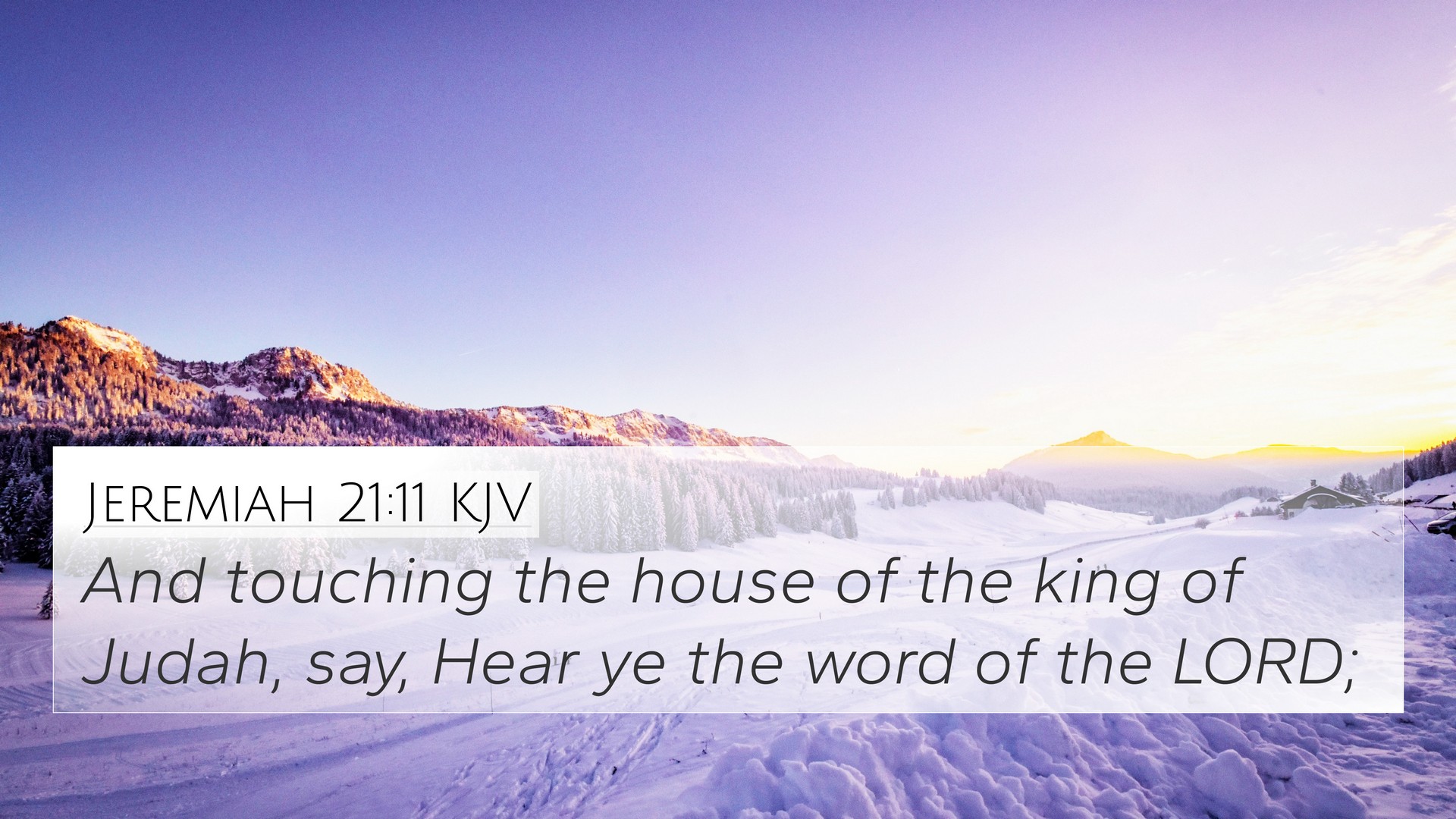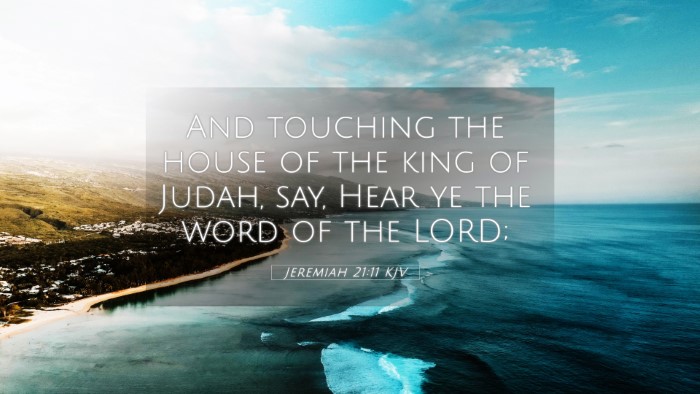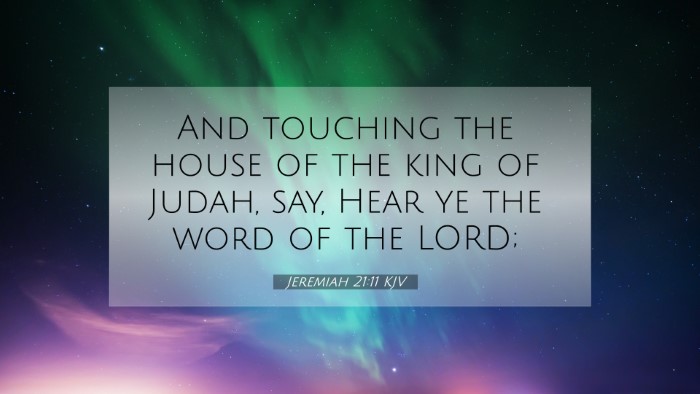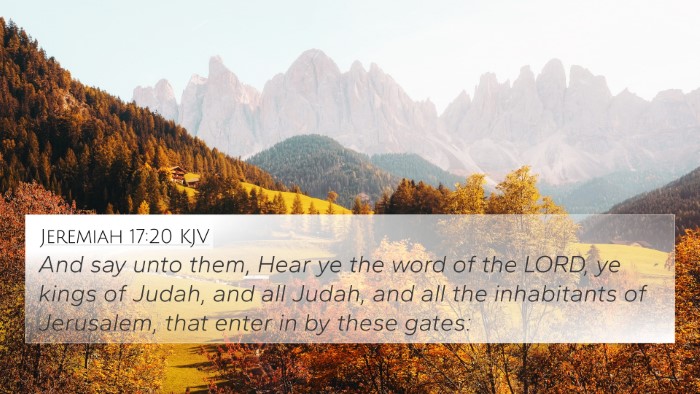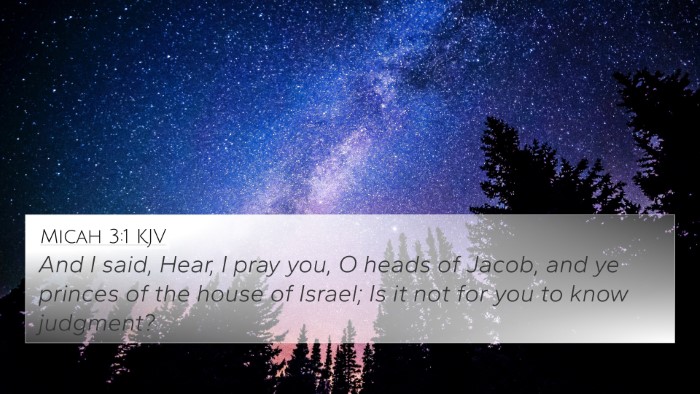Understanding Jeremiah 21:11
The verse Jeremiah 21:11 states:
"And unto the house of the king of Judah, say, Hear ye the word of the Lord; O house of David, thus saith the Lord; Execute judgment in the morning, and deliver him that is spoiled out of the hand of the oppressor, lest my fury go out like fire, and burn that none can quench it, because of the evil of your doings."
Meaning and Insights
This verse serves as a poignant reminder of God’s expectations of justice and righteousness from the leaders of Judah, particularly the house of David. The call to action is clear; the leaders must deliver justice and aid those who are oppressed.
Key Themes Explored
- Divine Instruction: The Lord commands the leadership to act justly, highlighting that God's authority encompasses not just spiritual matters but also social and political responsibility.
- The Role of the Righteous: The verse emphasizes the importance of delivering justice during the day ("Execute judgment in the morning"), which can symbolize a time of clarity and visibility in one’s actions.
- Consequences of Injustice: The mention of God’s fury as a consuming fire signifies the seriousness with which injustice is viewed by God, reinforcing the weight of this divine admonition.
Commentary Insights
According to Matthew Henry, this verse reflects God's earnest desire for justice among His people, specifically through their leaders. It underlines the urgent call for them to protect the innocent and serve as advocates for justice.
Albert Barnes emphasizes that the term "house of David" serves as a reminder of the covenant God made with David, and it carries an implication of accountability to God for the leaders’ actions. The expectation is that they will act in a manner befitting their lineage and the covenantal promises.
Adam Clarke elaborates on the imagery of fire, noting that it symbolizes not only judgment but also purification. The verse serves as a warning that failure to uphold justice could lead to severe consequences that impact both the king and his people.
Bible Verse Cross-References
Jeremiah 21:11 connects with several other Bible verses that reinforce its themes:
- Isaiah 1:17: "Learn to do well; seek judgment, relieve the oppressed, judge the fatherless, plead for the widow."
- Micah 6:8: "He has shown you, O man, what is good; and what does the Lord require of you but to do justly, and to love mercy, and to walk humbly with your God?"
- Psalm 82:3-4: "Defend the poor and fatherless: do justice to the afflicted and needy. Deliver the poor and needy: rid them out of the hand of the wicked."
- Proverbs 31:8-9: "Open your mouth for the mute, for the rights of all who are destitute. Open your mouth, judge righteously, defend the rights of the poor and needy."
- Jeremiah 22:3: "Thus saith the Lord; Execute ye judgment and righteousness, and deliver the spoiled out of the hand of the oppressor..."
- Ezekiel 18:30: "Therefore I will judge you, O house of Israel, every one according to his ways, saith the Lord God. Repent, and turn yourselves from all your offenses..."
- Matthew 23:23: "Woe unto you, scribes and Pharisees, hypocrites! for ye pay tithe of mint and anise and cumin, and have omitted the weightier matters of the law, judgment, mercy, and faith..."
Connections Between Bible Verses
The overarching theme of justice in Jeremiah 21:11 finds resonances in various parts of Scripture.
- Thematic Bible Verse Connections: Justice, righteousness, and the responsibility of leaders appear repeatedly throughout the Bible, calling for an ethical and moral governance.
- Bible Verses That Relate to Each Other: Cross-referencing Jeremiah 21:11 with passages from the prophets highlights a continuous divine demand for justice throughout Israel's history.
- Inter-Biblical Dialogue: The New Testament further examines these themes, particularly in the teachings of Jesus, who emphasized the need for inner righteousness to match external actions.
Conclusion
Jeremiah 21:11 serves as a reminder not only for ancient rulers but also for present leaders and individuals, stressing the eternal value God places on justice and compassion. By engaging in cross-referencing biblical texts, we can uncover richer meanings and gain deeper insight into the moral expectations set forth in Scripture, making this verse pertinent for personal reflection and corporate responsibility.
